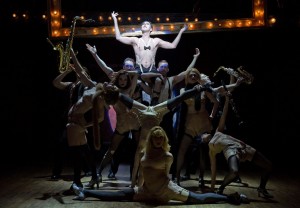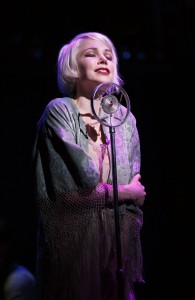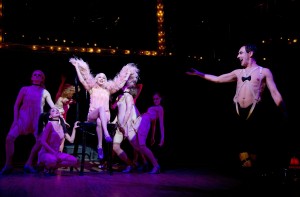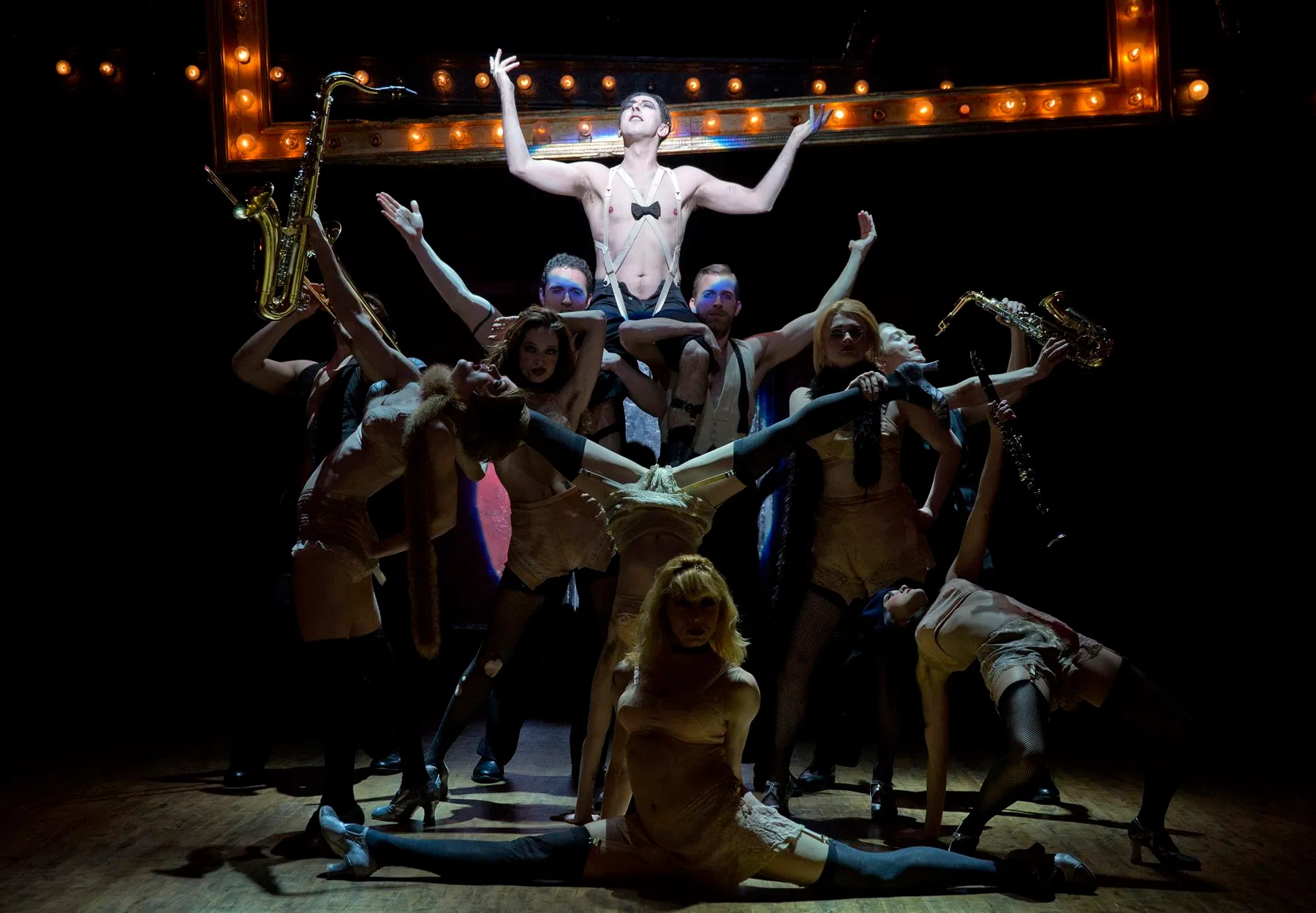
In a recent appearance on “Charlie Rose,” director Sam Mendes was asked why he keeps revisiting the 1950s’ Kander and Ebb musical “Cabaret”; he first revived it at the Donmar Warehouse in London in 1993, then on Broadway in 1997, and now he’s mounted it again at Studio 54 in New York.Mendes explained that it’s one of the great 21st-century plays, and probably the best play to explain how the rise of Nazism could have happened.”Cabaret” is the story of two couples in love – the young Sally Bowles and her American writer, Cliff Bradshaw, and the older Fraülein Schneider and her Jewish beau, Herr Schultz – who, because of the Nazis, can’t be together. They’re all so caught up in the party going on in Berlin, and the harsh realities of getting by on a day-to-day basis, that nobody notices the Nazis are gaining a scary amount of power.
Mendes’ way into the play was to radically turn the theater itself into the Kit Kat Club, the nightclub where much of the play’s action occurs, implicitly making us, the audience, complicit in the action. Alan Cumming, who plays the emcee, has been the one constant in all of Mendes’ renditions. He’s the perfect seductor: openly bisexual and highly sexual with great charisma and comic timing.
The play opens with a spotlight on the emcee’s finger, beckoning us into the hedonistic club to join the party. Soon, we see Cumming in a bowtie, pants, suspenders and nothing else. As Cumming belts out a fun, amusing and catchy “Wilkommen,” we feel like we’re really entering the Kit Kat Club.
Here, we meet the girls of the club — all of whom the emcee claims are virgins while being very grabby with them — including the club’s gem, the inimitable singer, Sally Bowles (Michelle Williams). With the help of choreographer Rob Marshall, the dancing has been greatly polished since the Donmar run — now up to Broadway standards — and the band, in period dress, is excellent too.
Our way into the action comes through the all-American writer, Cliff Bradshaw (Bill Heck), who arrives in Berlin to write his novel, and maybe to shag some men and women, too. On the train, he meets the native, Ernst Ludwig (Aaron Krohn), who uses him to smuggle in something from Paris, and befriends him.

Through Ernst, Cliff finds cheap lodgings with Fraülein Schneider (the excellent Linda Emond), where he meets his neighbor Fraülein Kost (Gayle Rankin), who is always sneaking in and out various men at night to make a living. On Cliff’s first night in town, he heads to the Kit Kat Club. There, he meets the self-absorbed Sally Bowles, who, before long, will be talking her way into his bed.
Of the two pairs of lovers, the elder one is the most absorbing. As a lifetime spinster, Fraülein Schneider is emphatically flattered by the attention of her tenant, the fruit seller Herr Schultz (Danny Burstein). Their courtship gets serious when he brings her a pineapple as a gift, prompting the touching ditty, “It Couldn’t Please Me More,” during which Schneider offers Schultz some pineapple and he replies, “that might be nice/but frankly, it would give me gas.”
Both Burstein and Emond have strong voices and stage presences, making this ordinary couple extraordinary to watch. As two sad, lonely people, they need this romance, and when they sing “Married,” we can picture the future they picture, although we know what they don’t: It’s going to be a problem that Herr Schultz is Jewish.
I found this Sally and Cliff a little harder to buy as a pair. Michelle Williams is very effective at hinting at Sally’s frailty and insecurities while putting on the fairly transparent airs of sophistication: She aims to shock with her sexual experience and fascinate with her personality, and in Cliff she finds a willing audience. But sometimes Williams is too convincing as the vulnerable Sally that I wonder what Cliff sees in her; it always seems possible to see right through her.
Her first number at the Kit Kat Club, “Don’t Tell Mama,” finds her sitting in an over-sized chair, dressed in an undersized dress, acting like a little girl, and it takes her a long time to shed that ignorant innocence. When Sally moves in with Cliff, rent increases, and to scrape by, Cliff agrees to smuggle in packages for Ernst Ludwig. He knows it’s for “a good” political cause, but doesn’t ask for more information.
Slowly and gradually, the Nazis start to seep into the Kit Kat Club. The emcee acts both as our guide and as a signpost for the increasing intrusion of the Nazis. When he appears onstage to hold the pineapple, during “It Couldn’t Please Me More,” it’s mocking and amusing, but also ominous.He comes onstage to play a record with the Nazi anthem, “Tomorrow Belongs to Me.” He cheekily reveals a swastika tattooed to his rear end, as if it’s a joke, and shows up at Herr Schultz’s store to witness a large rock getting thrown at the window. And he leads the Kit Kat Girls through a seemingly fun and innocent song, “Money.”
When Herr Schultz and Fraülein Schneider host an engagement party, and Fraülein Kost makes an off-hand comment to Herr Ludwig about how the Jews, like Schultz, have all the money, the pieces start to move into place. It’s also the first time we see Herr Ludwig with a swastika on his arm. The first act ends with Fraülein Kost leading the party in a rendition of “Tomorrow Belongs to Me.” It’s a tune so catchy you’ll find yourself humming it to yourself during intermission, and then, creeped out, firmly telling yourself, “That is not a song that you sing to yourself!”
Things get darker in the second act now that Herr Ludwig’s affiliation has been revealed and Cliff realizes he’s been unknowingly helping the Nazis. But the party isn’t quite over yet, and act two still starts with the show-stopping “Entr’Acte” followed by Alan Cumming, in a dress, joining the chorus line in “Kick Line.”Before long, a scared Fraülein Schneider is calling off the wedding because of the Nazis, and a confused Sally wonders, in the play’s most key line, “What’s politics got to do with us?”When Sally finds herself pregnant, even though she’s in love with Cliff, who can be impatient and brutish in response to her childish behavior, Cliff sees it as an opportunity to leave and start a family. She only sees the scary prospect of the party ending.

By now, the songs at the Kit Kat Club take less time to reveal their true intents. When the emcee sings the amusing – well, amusing if you haven’t seen the play before, or can’t see where it’s going yet – but ultimately chilling, “If You Could See Her,” in which he dances with a gorilla that he says you’d like if you could see her like he does, it doesn’t take long to reveal it’s a metaphor for something darker.
As the Nazis and the world close in on our characters, so too does the onstage lighting. In a spotlight, the emcee unravels as he belts out “I Don’t Care Much,” in which he shows that he’s a terrified wreck who doesn’t know how to exist outside the disguise of the nightclub.When Sally Bowles sings the title song, “Cabaret,” about just how much things are over, the spotlight gets tighter, with just her face illuminated in a harsh light. This is Michelle Williams at her best: Her lovely vibrato voice quivers, her face is no longer able to maintain the façade and you see a woman ready to end it all.
When she sings “What use is sitting alone in your room/Come hear the music play … life is a cabaret, old chum,” it’s a scary image that is only made scarier when she goes on to tell the story of her roommate Elsie in Chelsea, who on “the day she died the neighbors came to snicker/‘Well, that’s what comes from too much pills and liquor.’”She’s not just talking about her own life. At the very end, the emcee takes off his leather trench coat to reveal his striped pajamas with a Star of David and a rainbow — he’s the most doomed of all.
If you’ve seen “Cabaret” before, it’s chilling and terrifying and fun, all from the start. You know what’s coming and how it’s coming, and you’re still caught up in the party.
The essentials haven’t changed since the Donmar production, although the sheer size of Studio 54 means some of the intimacy of the space has been lost; nonetheless, even if you’re at one of the back tables, you feel you’re at the Kit Kat Club, and that you, too, could be as susceptible to taking part in the action.
If you’re new to the show, the chill creeps in even more gradually. You know the Nazis are coming, and that Cliff’s casual interest in reading “Mein Kampf” telegraphs something bleaker, but the show still has plenty of surprises. You’ll have a blast, and you’ll leave singing the catchy “Cabaret” with a smile on your face. But the foul taste will also remain.
